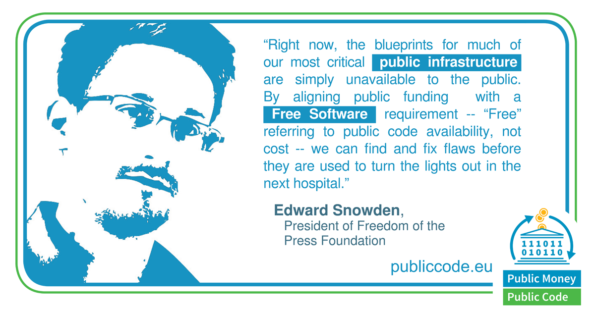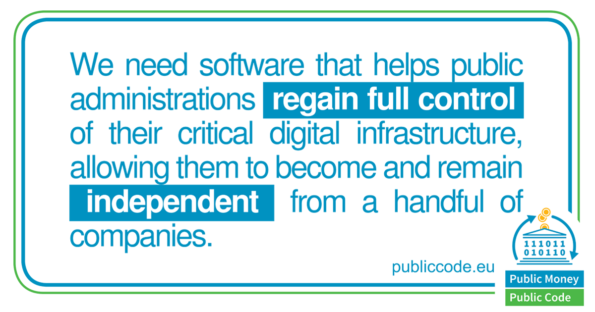Public Money! Public Code? Campaign Launched
Your taxes are being used to pay for closed source software and this is a terrible idea.
Closed source software (also known as “proprietary software”) cannot be modified or even studied. This poses severe problems that Free Software (that is, the programs you *can* copy, distribute, study and modify freely) helps avoid. With our Public Money? Public Code! campaign, the FSFE are proposing that all software that is developed using public funds be made publicly available as Free Software.
There are several good reasons for this. Firstly because, although you are paying for closed software now, you are not benefiting from it. Quite the contrary: often you are suffering because of it. Most public institutions pay to develop programs that they do not or cannot release to the public. This means that other institutions that need to solve similar problems have to develop the same solution again. And each time the public has to foot the bill.
If the software were Free Software, other public institutions, companies and NGOs would be able to take applications and re-use them and this would have no extra cost for society.
Paying a company to provide closed software also leads to vendor lock-in. Vendor lock-in is when an institution contracts a certain provider and later discovers it is very hard to switch to another one. Companies with a stranglehold on an institution can artificially restrict usage and features of their products. They can refuse to allow you install their programs on more than a handful of computers, or disable saving your work in a certain format. They can hike the prices of licenses for no reason, charge expensive rates for small changes, or even to lift the restrictions they themselves have imposed.
With Free Software, if the provider tries to extort our public institutions, or starts to behave unethically, you can switch to another firm or pass on the maintenance of the software to internal IT staff.
Most software is often insecure, but closed software makes solving flaws especially hard and expensive. Even if you know how to solve its vulnerabilities, you would not be legally allowed to do so. Many branches of our public administration often have to keep running insecure software because they cannot afford to pay for the newer version. Newer versions also need more powerful hardware to run, making it doubly impractical to upgrade. The recent leaking of citizens’ private data, electoral espionage and ransomware attacks are all consequences of leaky and outdated proprietary software that was too expensive to renew.
Furthermore, closed source providers often include in their software code that collects data they have no business in collecting. This data can end up in the power of foreign security agencies, sold to unscrupulous advertising companies, or worse. This is bad when it happens to an individual, but it can be disastrous when it happens to a public institution, where thousands of confidential files can be stolen in one go.
With Free Software, independent researchers can report earlier on errors, before even miscreants can use them. Experts from anywhere can provide solutions for applications because they can study the code. They can also audit the software to eliminate backdoors or other malicious code. By using Free Software, citizens’ data is kept safer and the chances of successful attacks from criminals goes down. Free Software can also be used as the foundation for better applications, building upon it to create more efficient and safer programs.
None of this is possible using closed and proprietary software.
That is why public Money should fund public code. The FSFE is launching the Public Money? Public Code! campaign to encourage public institutions to open up and freely distribute software created in-house or commissioned to external companies. We want code financed with public money to be distributed as Free Software. Free Software is a common good and benefits everybody equally.
What you can do to help
Check out the website we created to coordinate all the moving parts of this campaign. We have also published an open letter on our site. The letter explains to politicians and policy makers why using public money to fund public code is a good idea. You can sign this letter and we will send it to political representatives several times over the next months. We want politicians to take notice and convince them to pass legislation to make things right.
So visit the PM?PC! site, sign the letter and spread the word on social media and to your colleagues, friends and family.
Thanks!

